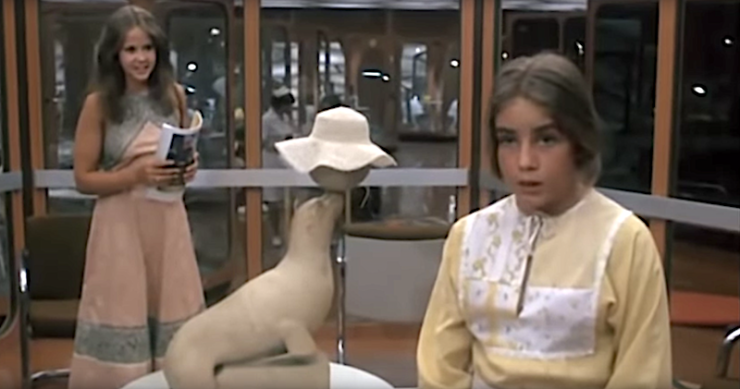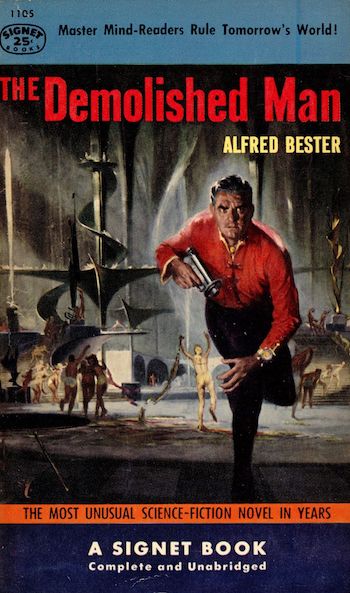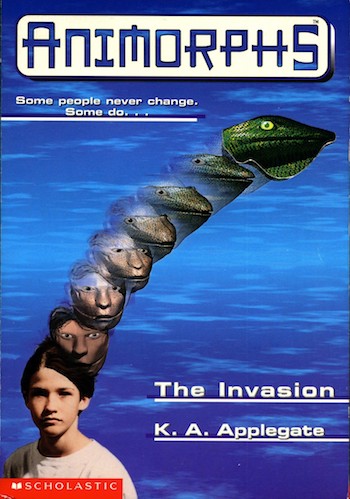Telepathic powers crop up everywhere in science fiction, fantasy, and even horror. But often those world-altering abilities are relegated to the occasional performance of mind-reading, or projecting thoughts into the head of another. They’re a helpful (and sometimes incredibly fun) plot device that helps a story keep rolling. But what about those stories where telepathy moves beyond a useful party trick and into a thoughtful rumination on some aspect on humanity or consciousness? These are some of our favorite SFF tales involving the ever-desirable (or is it?) talent of mind-reading.
Telepathy for Better Relationships

Star Trek: The Next Generation’s seventh season episode “Attached” is full of some of fan fiction’s greatest tropes, including Being Suddenly Telepathically Connected to Someone You Have A Complicated Relationship With. When Captain Picard and Dr. Crusher are implanted with a device at the behest of the Prytt people, they realize the devices allow them to read each other’s thoughts. When they try to get distance from one another to stop the problem, they’re hit with horrible nausea, forcing them into each other’s company. It’s basically a mechanical solution to a very human problem, as Picard and Crusher really don’t want to talk about their feelings for each other. By the end of the episode, they do get a laugh in at Commander Riker’s expense, but Beverly still tells Jean-Luc that any romance between them needs to go slow.
Telepathy as a Holy Power

Has everyone seen The Exorcist? The original film posits a terrifying universe where evil can attack innocent young girls at random—Regan MacNeil is perfectly fine one day and spouting pea soup and obscenities the next. The (utterly bonkers) sequel, Exorcist II: The Heretic, retcons this chaotic evil, revealing that Regan MacNeil wasn’t a random victim at all. It turns out that she was targeted by the Devil because she has an innate, vaguely holy telepathic ability. We learn this because she uses this talent to probe the mind of a non-verbal autistic girl, and helps her speak with her therapist. And this being the 1970s, the therapist then gently chides Regan for using her mind powers without asking the girl for permission first. And this is no one-off scene: the film ends with Regan channeling her powers to fight Satan, rescue a priest, and kind of make her old house explode?
A slightly less dramatic but even holier use of telepathy crops up in Dante’s The Divine Comedy. While his Good Pagan guide Virgil is shown to be maybe a little psychic, or at least super perceptive, it’s when Dante gets a guided tour of Paradiso that telepathy gets center stage. Since, technically, everyone in Paradise is literally inside the Mind of God, everyone is sort of in a constant, instantaneous mental conversation. Dante’s muse Beatrice uses this power to cut through Dante’s defenses, answer his questions, and give him inspiration to get back on a leopard-and-wolf-free path to the Good Place.
Telepathy with Rebellious Intent

Vylar Kaftan’s novella Her Silhouette, Drawn in Water opens in the middle of Bee’s life sentence, both literally and figuratively: shimmying through the damp, dank tunnels of the prison planet Colel-Cab with fellow inmate Chela, Bee can neither remember the heinous crimes that sent them here nor fathom ever getting out. They are telepaths, her lover and her rock Chela reminds her, so powerful that they snuffed out four thousand and thirty innocent lives on a starship in mere minutes. With every attempt to tap back into her telepathic power inducing debilitating migraines, Bee has no choice but to believe Chela’s explanation.
Except. What Chela describes sounds so much more like telekinesis. We readers know our X-Men, and it seems as if Chela is trying to cast Bee more as Jean Grey than Charles Xavier—and Bee, herself a professed sci-fi fan, begins to wonder why it is that she can’t reach out with her mind when she’s supposedly the most powerful telepath of her generation.
Prisons are made to be busted out of, and as Bee takes in the world outside Colel-Cab, she comes to discover why she had such a mental block. As Kaftan points out in her own article on ESP, Bee’s abilities to locate allies, communicate in ways untraceable by cell phone towers, and—most crucially—pass on vital information makes her and her fellow rebels scarier than any story about going all Dark Phoenix on a random spaceship.
Buy the Book


Her Silhouette, Drawn in Water
Telepathy in High Society

How does a society function when telepathy is utterly common? Alfred Bester posited such a society in his novel The Demolished Man. Known as “Espers” or “peepers”, telepaths are viewed as a particular class of people in the future Bester creates, with varying levels of skill and inherent ability. They can be trained as well, and have societal rules they must follow in order to be accepted by other Espers. People without their abilities may hire Espers to block other, lower Espers from reading their minds, which is precisely what the story’s central character Ben Reich does when he plans to commit a murder at a party where several Espers are present. The way Espers are folded in to the world has many similarities with what Babylon 5 would later posit using its own class distinctions with telepaths.
Buy the Book


The Demolished Man
Telepathy in Middle-earth!

Like a lot of the magical elements in Middle-earth, Tolkien used telepathy sparingly, but also completely matter-of-factly. There is evidence that Maiar and High Elves can communicate telepathically, but we only see them do it a few times—and even then, only one instance is particularly dramatic. One of the ongoing building tensions in the trilogy is Frodo’s fraught relationship with the Ring, and at one point when he puts it on he hears a voice yelling at him: “Take it off! Take it off! Fool, take it off! Take off the Ring!” Now this certainly sounds like a certain grumpy Wizard, but only hundreds of pages later do we get confirmation of this. Late in Return of the King, after Sauron is defeated, Tolkien gives us a literal meeting of the minds between Galadriel, Celeborn, Elrond, and Gandalf, where we’re explicitly told “they did not move or speak with mouth, looking from mind to mind: and only their shining eyes stirred and kindled as their thoughts went to and fro.”
In Peter Jackson’s films, Sauron speaks directly into Frodo’s mind on several occasions, and it’s implied that he bewitches poor Pippin through the Palantir. Gandalf and Saruman have a magical tug-of-war for Theoden that seems to result in Gandalf landing a physical blow through the conduit of Theoden’s mind. And, of course, Galadriel speaks directly into the minds of the Fellowship, with the audience hearing her thoughts in a whispery voiceover that contrasts with her bland spoken words of welcome. Frodo, Gimli, and Boromir all receive more direct messages: Frodo is invited to use her scrying pool, she enchants the heck out of poor besotted Gimli, and she straight up tells Boromir that he’s the weak link.
Telepathy by Machines

Iain M. Banks’s utopian society known as the Culture is largely possible due to the advent of Minds, which are super-sophisticated A.I.s that make post-scarcity living possible for all its citizens. These Minds are constantly upgrading themselves, and have a bent toward benevolence no matter how mischievous they might be. They also technically have the ability to read minds, and it’s the mechanism that Banks suggests that makes this ability for unique—the Minds can essentially examine the processing of living brains, giving them the ability to know what that brain will do next. This is largely considered a taboo with the Culture, so it doesn’t happen often; the only Mind who breaks the taboo is GCU (General Contact Unit) Grey Area, who is then shunned by the rest of the Minds in Excession.
Buy the Book


Telepathy as a Universal Language

In John Carter of Mars, the indigenous name for the Red Planet is Barsoom, and the planetwide language is Barsoomian. But it isn’t just the “people” of Mars who speak it, it’s all Barsoomians, from the highest echelons of society all the way down to the livestock. This is already unusual enough to John Carter, late of Earth, who can’t exactly communicate with cattle and horses back home. But where it gets even more unusual is that the Barsoomians largely communicate telepathically. As Carter himself puts it, telepathy is: “wonderfully developed in all Martians, and accounts largely for the simplicity of their language and the relatively few spoken words exchanged even in long conversations. It is the universal language of Mars, through the medium of which the higher and lower animals of this world of paradoxes are able to communicate to a greater or less extent, depending upon the intellectual sphere of the species and the development of the individual.”
Buy the Book


John Carter of Mars
Telepathy as Subliminal Manipulation

In S.L. Huang’s Cas Russell series, there are plenty of people with powers, but Russell herself isn’t one of them—she’s just highly physically trained and brilliant at math. She specializes in retrieving property for people, and is eventually contracted to retrieve a person from a Columbian drug cartel, a young woman named Courtney. But there’s a private investigator on Russell’s trail who suspects her of being part of a conspiracy, and Russell can’t dismiss the idea outright because she knows someone has messed with her own mind. What’s more frightening about this is that it’s not your run-of-the-mill telepathy that’s been manipulating her. Whoever has messed with her head has used a technique that works on the subliminal level. It’s a more realistic way of looking at how power over the mind might work, with a more deft touch than we usually get from characters like Professor X.
Buy the Book


Null Set
Telepathy as a Link to Humanity

When dying Andalite prince Elfangor bequeaths his people’s morphing capabilities to a handful of human preteens, he fails to mention that the ability to morph into any living being they touch includes another nifty dimension: <thought-speak!> It’s not technically telepathy, as the mouthless Andalites evolved this form of nonverbal communication to be more about transmitting universal symbols than directly-translated thoughts. That means, however, that there are few language barriers to thought-speech, that as long as members of two species have the right transmitters in their brain, they can understand one another almost instantly.
For the Animorphs, that’s only when they’re in animal morph (ignoring the occasional continuity error in which a human can generate thought-speech). Thought-speak serves many functions for this fledgling resistance group, from sassing one another and bantering during missions to communicating with nothlits trapped in their morphs. For Tobias, stuck in the form of a red-tailed hawk, thought-speak provides a link to his friends and his humanity. And when the team must purposely trap the murderous Animorph David as a rat, Rachel stands guard—he spends the entire time raging, begging, and sobbing in thought-speak that still haunts her nightmares.
Thought-speak provides a fascinating foil to the invading Yeerks themselves: in trying to stop the alien slugs from slithering into human brains and taking over their consciousness, it’s darkly ironic that one of the Animorphs’ tools allows them to push their way into other people’s skulls. Yet another example of how K.A. Applegate told traumatic stories with just enough disarming cheesiness.
Buy the Book


Animorphs #1: The Invasion
Telepathy Sucks

Both Misfits and Torchwood explore a simple but important aspect of telepathic ability: it sucks. Knowing what people truly think about you (especially knowing that the human mind is bound to think plenty of uncharitable things in a day without truly meaning it) is not something that anyone should strive for. In Misfits, a group of teens develop superpowers that reflects the struggle of adolescence, so it makes perfect sense that Kelly Bailey would be “gifted” with telepathy—being scared of what other people think is a preoccupation that floods most teenagers as they’re growing up. She later exchanges the ability for the brain power of a rocket scientist, which makes her much happier.
In “Greeks Bearing Gifts”, a season one episode Torchwood, Tosh comes into possession of a fancy alien necklace that allows her to read the thoughts of everyone in her vicinity. Given that the whole Torchwood team have an abundance of their own personality flaws, she ends up hearing all sorts of terrible things that her coworkers are thinking about her. (Particularly Owen, since he’s a right old jerk.) While that part is awful, it does lead to a fun fling with an alien, so that’s nice. But the alien turns out to be a murderer, so that’s not nice. The point is, having telepathy can be a bummer.











Now I can’t help but wonder if JMS read The Demolished Man. The parallels drawn here between the Psi-corps of Babylon 5 and the class of Espers? And the best-known Psi-cop is named Bester? That’s way too many coincidences.
Not just “Bester”, the psi-cop’s first name is Alfred and yes JMS has said he named him after the author of The Demolished Man.
Tension, apprehension, and dissension have begun…
Connie Willis’ novel Crosstalk has people having surgery to be telepathically connected to their ‘true love.’ Chaos(naturally) ensues.
Does What Women Want count as SFF? :P
Slan?
Telepathic communication with a ghost living in a giant computer? Luke Skywalker did it in the old Star Wars EU.
Julian May’s novel ‘Intervention’ has a scene where telepathic twins Rogi and Don briefly merge their minds (that combines their powers) to fight off a school bully in 1950’s America.
Larry Niven’s Gil the Arm (a telekinetic) had a telepathic minder back at HQ. She could, on request, check in on field agents who anticipated risky missions.
Telepathy was a fine way of moving the plot forward but led to some really lazy writing. Protagonists solved every challenge with their psychic powers. More recently telepathy has been replaced by the hacker/electronics expert /nerd who achieves the same result by keyboard strokes and vague computerish language.
Has anyone read Kathryn Lasky’s Starbuck Family series? It was about a family with two sets of twins who used their telepathy to talk to each other during their family’s work trips. In the second book, Shadows in the Water, the two older twins, Liberty and July, discover they can talk to dolphins.
Ethan of Athos: when Doctor Ethan learns telepathy is possible, his first thought is using it to communicate with non-verbal patients, like locked-in or very young patients. This is not was his informant, who grew up as a military lab rat, expected.
I have horrible news of a woman by the name of Hamilton that has telepathic abilities and has been crucifying people and making them commit suicide from over 900 miles away in a small town called Big Bend California. This woman has no soul and only wants to torture people and kill them. Since covid19 stared back in December of 2019 she has been infiltrating people mind and controlling their free will. Its only effecting people that are isolated and that’s why its gone unnoticed! They either do everything she orders them to do or are completely paralyzed in there homes going with out food, water, sleep or movement. They are suffering a horrible death and she is getting away with it because the government is ignorant to telepathic abilities being used to take free will. I was torture by her and she has the ability to read my mind and I have the ability to send thoughts to those that are effected by this. There are about 1000 people suffering in there homes due to this and I am the only one who knows that has there free will. She has been trying to kill me ever since I escaped with my life. I live in constant fear for my life and other’s but can’t get anyone to take me serious. I am more than willing to volunteer my self to prove that its actually happing. I believe we need to do a mandatory mail collection day and those that don’t collected or answer the door will need to be rescued asap. Evey day is critical and I am fighting her all by my self. This is another Holocaust and there are people all deprived of basic necessities. I need help with this I can’t take her down by my self and she is killing people slowly evey day. No one is getting evicted out of their apartments for not paying rent so there bodies are slowly decaying. This is American and there is terrorist infiltrating our minds and there is nothing I can do about it but reach out online for support. Please I ask of you if you value your freedom fight for those that don’t have it or it will be the death of us all. phoenixskyler007@gmail.com
Reply
In James Schmitz’s Agent of Vega stories telepathy is positively mundane, used routinely for interstellar communications and there’s all kinds of psi tech available for the minimally talented to use.
Telepathy Sucks is the perfect summary for Robert Silverberg’s novel Dying Inside.
Poul Anderson wrote a short story—I don’t remember the name—featuring a man who is essentially lonely. That’s because he is a telepath, in a world of non-telepaths.
He finally finds traces of another telepath, and eventually meets her. Now he reads her mind, while she reads his. Both telepathically scream “I hate you!” Then get as far away from each other as they possibly can.
The end.